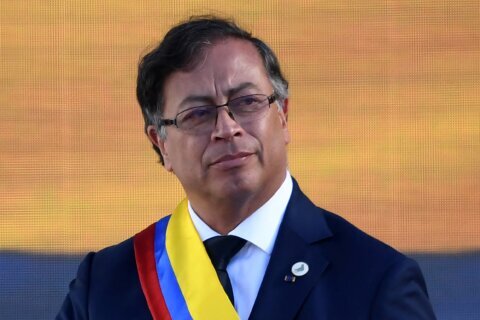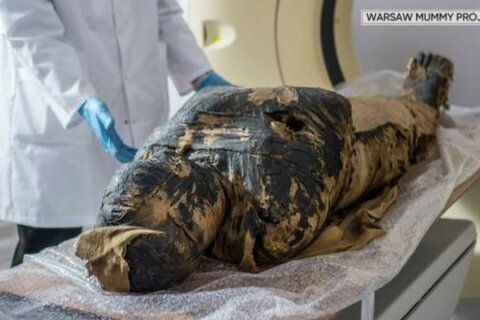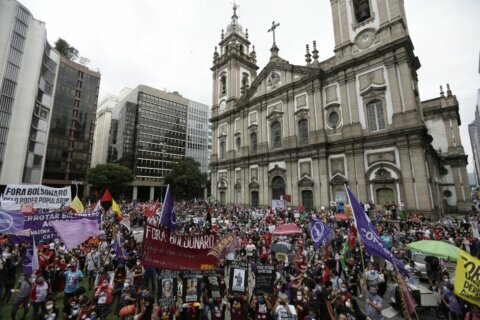On April 30, Venezuela seemed to be on the verge of a historic military and civilian uprising. The next day, that momentum died, and the country that had been bracing for change ended up trudging into a week much like any other.
As opposition leader Juan Guaidó and his US ally puzzle over their failures to wrest control of the government from Nicolas Maduro, the embattled president is moving to assert his strength and enforce a new normal across Venezuela. In the past 10 days, his administration has blamed his former intelligence chief Manuel Cristopher Figuera for the uprising, purged the military of disloyal members, forced opposition politicians into hiding and re-opened borders with its neighbors.
Things are under (Maduro’s) control, the government seems to be saying. Yet the country continues its economic downward spiral. And Guaidó, who has been recognized by more than 50 nations as the country’s legitimate interim president, is not backing down; as his movement entered its fifth month, he called for renewed protests on Saturday, May 11.
Before it all kicks off again, here’s what has happened over the past week.
Venezuela re-opens borders with Brazil and Aruba
After months of border closures due to tensions over humanitarian aid deliveries, some have been re-opened, demonstrating that Maduro’s government remains in control of its borders. On Friday, Venezuela’s Economy Vice President Tareck El Aissami declared in a televised speech that the country’s borders with Brazil and Aruba had been re-opened in order to “restore economic, social, political and cultural life.”
Opposition politicians under attack
But restoring Venezuela’s “economic, social, political and cultural life” is at odds with developments inside the country: At least 10 legislators from the opposition’s National Assembly were stripped of their diplomatic immunity by the Venezuelan Supreme Court these past few days. The court alleged that they were part of last week’s attempted uprising, and accused them of “treason, conspiracy, instigation of an insurrection, and civil rebellion,” among other crimes.
Three of these politicians have gone into hiding, requesting protection at the Argentine and Italian embassies in the capital city Caracas. So has opposition leader Leopoldo Lopez, a longtime mentor to Guaidó, who is now sheltered with his family by the Spanish Ambassador. Lopez broke his years-long house arrest last week, appearing alongside Guaidó as they called for the military to join their movement.
Not all have found protection. National Assembly Vice-President Edgar Zambrano, a close ally for Guaidó, was detained by Venezuela’s intelligence agency (SEBIN) on Wednesday by nine hooded officers. When he refused to exit his car, they towed the entire vehicle to their Caracas headquarters, the Helicoide.
Guaidó’s military supporters have scattered
Perhaps fearing a similar fate, the soldiers who proudly wore blue bands last week in support of Guaidó are no longer advertising their loyalty. Many have gone into hiding, too afraid to speak out for fear of their own safety and that of their families, CNN has learned. Harassment, threats, intimidation are among the retribution their families can face.
Venezuela’s military is key to tipping the political balance between Maduro and Guaidó, who admits that too few troops defected that fateful Tuesday.
President Maduro has shown much of his support among the armed forces recently, appearing in a video on state-run television with hundreds of uniformed rank and file kneeling at his feet, chanting their support and loyalty for their commander in chief.
In a letter directed to the armed forces last week, Guaidó declared that it was time to act. That message, peacefully delivered on paper to different military bases across the country, was either burned or refused. But Guaidó and his supporters continue to call for the armed forces to switch sides, and argue that only fear of reprisal holds them back.
The protesters’ fate
Footage from last week’s uprising captured government vehicles appearing to target and drive into crowds of protesters. At least five people have died and around 233 people detained during protests across the country since April 30, according to Venezuela’s Attorney General Tarek William Saab. Amnesty International reports more that than 200 people were injured “during state repression of protests.”
But the protesters that CNN spoke to all voiced their determination to continue fighting for democracy. “We have to continue being in the streets, there’s no turning back,” 20-year-old student David told CNN. He did not give his last name for fear of reprisal.
“Of course, they are afraid. That is what a dictatorship produces. The relationship of a citizen and the state is that of terror,” Guaidó said in a sit-down interview with CNN’s Paula Newton this week. He added that he is not only “analyzing the discontent but organizing their hope,” so protesters can continue “mobilizing.”
The role of the United States
The US is keeping up its economic pressure on both the state oil industry and on high-ranking Maduro loyalists — on Friday, the US Treasury Department released a statement advising that “persons operating in the defense and security sector of the Venezuelan economy may be subject to sanctions.”
But not all Venezuelan citizens are happy with sanctions as a tool to support change in the impoverished nation. Tough US oil sanctions have forced Venezuelan oil exports to plummet, sharply exacerbating the country’s existing production issues. In February, several civilians told CNN’s Stefano Pozzebon that what they wanted was for the US to lift those blocks, saying that economic pressure was hurting the nation more than anything else. As recently as Thursday, a small group of protesters were seen in Caracas carrying banners and chanting, “no to the blockade.”
The US has backed away from a previous tactic of threatening military intervention in recent days. While administration officials continue to echo Trump’s claim that “all options are on the table,” there appears to be little political appetite for use of force, and neighboring countries have come out firmly against foreign military intervention.
What next?
Most Guaidó supporters told CNN that they see US military action only as a last resort. “Freedom,” Aristoteles Bustamante told CNN’s Michael Holmes. “I don’t want anyone in here — but if necessary, yes.”
For now, Guaidó’s movement must focus on reviving popular support, overcoming any fears and waning conviction among civilians. The protests planned for this Saturday call on protesters to “defend Venezuela and the AN (National Assembly) in the streets,” according to a flyer.
Both Bustamante and David say they’re in for the long haul. “Perhaps you’ve heard the phrase, ‘It’s better to live a few days in rebellion and fear than to live a lifetime in fear,'” David says. “That’s not what I intend to do.”
“We’re going to conquer this one way or the other,” says Bustamante, when asked about the movement’s current prospects. “Maybe not today, maybe not tomorrow, but one way or the other.”







